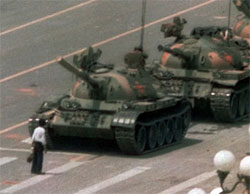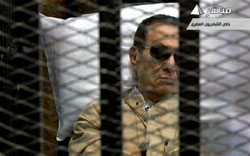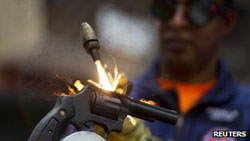News from Venezuela, China and Egypt
Tuesday's World Events — Posted on June 5, 2012
VENEZUELA – Government bans private gun ownership
Venezuela’s government banned sales of guns and ammunition Friday with a measure that officials said is aimed at fighting rampant violent crime. Under the new law, only the army, police and certain groups like security companies will be able to buy arms from the state-owned weapons manufacturer and importer. …
Until now, anyone with a gun permit could buy arms from a private company. Private gun shops are now prohibited from selling guns under the measure. President Hugo Chavez says the ultimate aim is to disarm all civilians.
Venezuela saw more than 18,000 murders last year and the capital, Caracas, is thought to be one of the most dangerous cities in Latin America. The government’s most recent statistics put the murder rate at around 48 per 100,000, although some non-governmental organizations estimate it’s much higher – 60 per 100,000 in 2011, one of the highest rates in the world. The global average is 6.9 murders per 100,000 people. Polls have repeatedly said that Venezuelans view violent crime as the country’s top problem.
Critics say the new gun laws and other recently announced measures, like a victim’s compensation fund, are just the latest in a long line of failed attempts to bolster security. [They note that only a small percentage of guns have recently been sold legally to permit holders and said most gun sales have long been illegal and unregulated. Luis Izquiel, a lawyer who heads a security committee for Venezuela’s opposition coalition, said that while there are about 25,000 gun permits legally registered with the authorities, there are many more weapons on the streets. In 2010, Amnesty International estimated there were a total of 10 million firearms in the country. “Here criminals don’t use legal firearms,” Izquiel said.]
Campaign group The Venezuela Violence Observatory said last year that violence has risen steadily since Mr. Chavez took office in 1999.
According to a recent United Nations report, South America, Central America and the Caribbean have the highest rates of murder by firearms in the world. It found that over 70% of all homicides in South America are as a results of guns – in Western Europe, the figure was closer to 25%.
CHINA – Tiananmen anniversary: Government arrests activists

Beginning the night of June 3, 1989 and stretching into the early morning of June 4, Chinese troops used lethal force to end a seven-week-long occupation of Tiananmen Square by democracy protestors in Beijing. In this iconic image, an anonymous man stands in protest in front of a column of Chinese tanks on June 5, 1989.
China’s communist government has arrested activists and placed others under increased surveillance to stop them from marking the anniversary of the Tiananmen Square [massacre].
Searches on social media sites in China have also been restricted to try to prevent any reference to the 1989 events.
The foreign ministry expressed “strong dissatisfaction” over a call from the U.S. to free those still in prison for their involvement in the protests. In 1989, the Chinese army shot dead hundreds of civilians rallying for democracy.
Beijing says the June 1989 events were a counter-revolutionary revolt and defends its response. The Communist Party still prevents any public remembrance of the event.
On Sunday, the U.S. government urged China to free all those still in prison after the crackdown on protesters. It called China’s “violent suppression” of the Tiananmen Square demonstrations a “tragic loss of innocent lives.”
From the capital, Beijing, to Fuzhou on the east coast and Guiyang in the far south-west, Chinese police have moved to detain and pressure activists. Hundreds have been rounded up in Beijing to prevent them from marking the anniversary, rights campaigners told AFP news agency.
A small group of elderly men who organized a protest in a park in Guizhou a week ago have been rounded up, says the BBC’s Damien Grammaticas.
A human rights group, the Dui Hua Foundation, estimates that almost a dozen activists arrested in the 1989 Tiananmen crackdown remain in jail.
EGYPT – Ousted President Hosni Mubarak sentenced to life in prison over protester deaths

Ousted Egyptian president Hosni Mubarak sitting inside a cage in a courtroom during his verdict hearing in Cairo (Photo: AFP/Getty)
Former Egyptian President Hosni Mubarak, who ruled his country with an iron first for three decades, was sentenced Saturday to life in prison.
Mubarak, 84, frowned when the verdict was announced, his eyes hidden behind sunglasses as he lay on a stretcher.
The verdict culminates 16 months of upheaval for Egypt, which captured the world’s attention with massive protests in Tahir Square [in Cairo].
Mubarak, a former military commander, assumed power in 1981 after the assassination of President Anwar El Sadat. He is now the second Arab leader convicted since a wave of uprisings swung through the region a year ago. Tunisia’s Zine el-Abidine Ben Ali was convicted in absentia last year. Libya’s Muammar Gaddafi was [killed by the protesters who captured him].
Mubarak, who resigned in February 2011, was found guilty of failing to stop the killing of more than 900 protestors during the Arab Spring. But the court handed down a mixed verdict, acquitting the deposed president and his sons – heir apparent Gamal and businessman Alaa – of corruption charges.
Before handing down the sentences, Judge Ahmed Rifaat denounced Mubarak’s reign, deeming it “30 years of darkness” and “a darkened nightmare” that ended only when Egyptians rose up to protest.
The corruption acquittals sparked anger in the courtroom, and lawyers for the victims’ families began to denounce the judge. “The people want to cleanse the judiciary,” they chanted. A few raised banners that read: “Allah’s verdict is execution.”
Thousands of riot police swarmed the square outside the courtroom and clashed with protestors. Later, hundreds of people swarmed Tahir Square for a gathering that was part protest, part celebration.
[In two weeks, a presidential election runoff will take place between Ahmad Shafiq – Mubarak’s last prime minister – and the Muslim Brotherhood’s candidate, Mohammed Mursi.](The news briefs above are from wire reports and staff reports posted at BBC.co.uk & an AP story at huffpost.com on June 1, BBC.co.uk on June 4, and NYDailyNews.com on June 2.)
Background
VENEZUELA:
For most of the first half of the 20th century, Venezuela was ruled by generally benevolent military strongmen, who promoted the oil industry and allowed for some social reforms. Democratically elected governments have [ruled] since 1959. Hugo Chavez, president since 1999, has promoted a controversial policy of "democratic socialism," which [aims] to alleviate social ills while at the same time attacking globalization and undermining regional stability. (From the CIA World FactBook.)
Under the presidency of Hugo Chávez Venezuela has seen sweeping and radical shifts in social policy, moving away from the government officially embracing a free market economy and towards quasi-socialist income redistribution and social welfare programs. (from wikipedia)
-------------------------------------------
CHINA:
June 4 is the anniversary of the crackdown on democracy at Tiananmen Square in 1989: (from bobsonwong.com/dfn/focus/china/tian10.htm)
- In April 1989, Hu Yaobang, the former reform-minded Communist Party general secretary [of China], died. Hu had been purged from the party leadership in 1987 [for his reform ideas], and Zhao Ziyang replaced him as general secretary.
- Hundreds of thousands of students mourned Hu's death by staging large demonstrations in Tiananmen Square in Beijing, the country's capital. Led by people like Beijing University student Wang Dan, the students demanded an end to government corruption, greater personal and political freedom, and improved conditions in China's colleges.
- The turning point came in May, when Soviet President Mikhail Gorbachev visited China. International journalists who came to Beijing to cover the summit beamed to the rest of the world live images of thousands of students occupying Tiananmen Square and going on a hunger strike.
- Behind the scenes, Chinese officials argued over what they should do. Moderates such as Zhao Ziyang advocated peaceful dialogue with the students. Hardliners such as Chinese senior leader Deng Xiaoping, who led the country through an economic reform process that limited political change, insisted on using military force to crack down on the demonstrations.
- The hardliners eventually prevailed. As demonstrations spread to other cities in May, martial law was declared. On the night of June 3-4, Chinese army troops moved into Tiananmen Square and dispersed crowds, killing and imprisoning thousands. Student demonstration leader Wang Dan was arrested and spent several years in prison before being paroled and exiled to the United States. Human rights groups estimate that hundreds of people detained after protests are still in custody.
- The Chinese government continues to refuse to acknowledge any wrongdoing. In the days before the ten-year anniversary, China stopped CNN from broadcasting into Beijing and arrested several dissidents.
-------------------------------------------
EGYPT:
Hosni Mubarak served as the fourth President of Egypt from 1981 to 2011.
Mubarak was appointed Vice President of Egypt in 1975, and assumed the presidency in October 1981, following the assassination of President Anwar El Sadat. His almost thirty-year presidency made him Egypt's longest-serving ruler since Muhammad Ali Pasha (who ruled in the 1800s). Before he entered politics, Mubarak was a career officer in the Egyptian Air Force, serving as its commander from 1972 to 1975 and rising to the rank of air chief marshal.
Mubarak was ousted after 18 days of demonstrations during the 2011 Egyptian revolution when, on February 11, Vice President Omar Suleiman announced that Mubarak had resigned as president and transferred authority to the Supreme Council of the Armed Forces. On April13, a prosecutor ordered Mubarak and both his sons to be detained for 15 days of questioning about allegations of corruption and abuse of power. He was then ordered to stand trial on charges of premeditated murder of peaceful protestors during the revolution. These trials officially began on August 3, 2011. On June 2, 2012, Mubarak was sentenced to life in prison. (from wikipedia)

